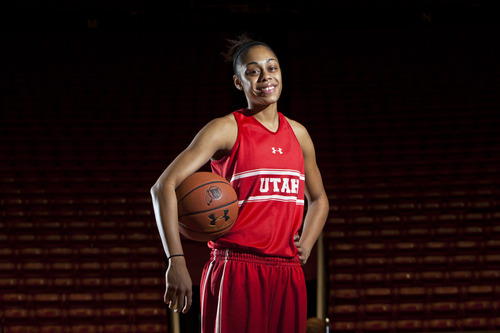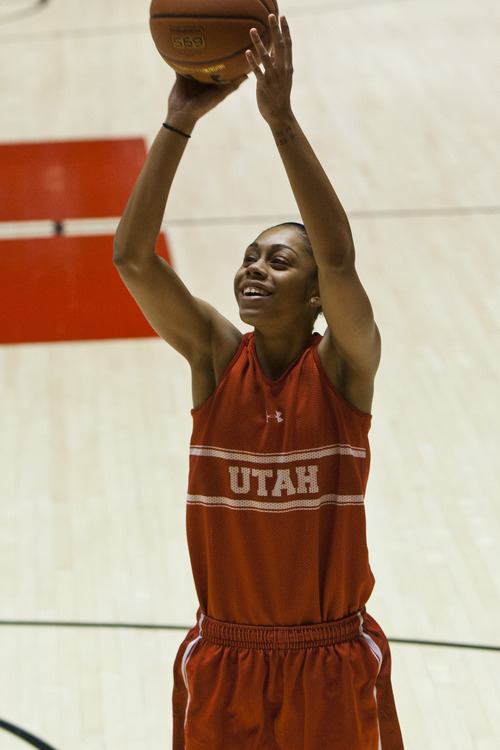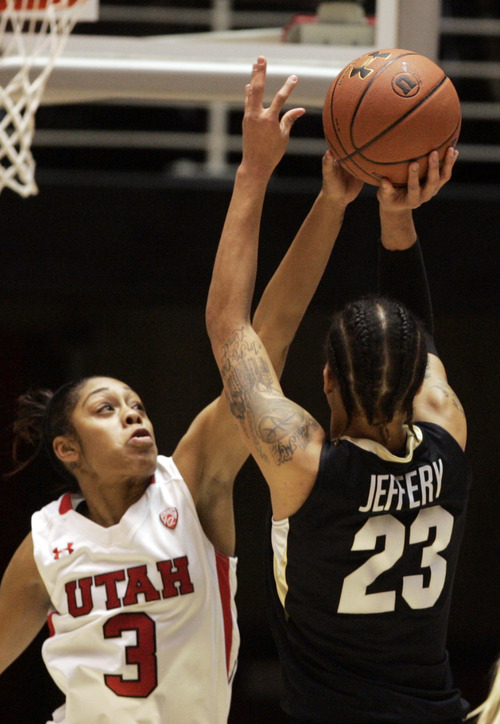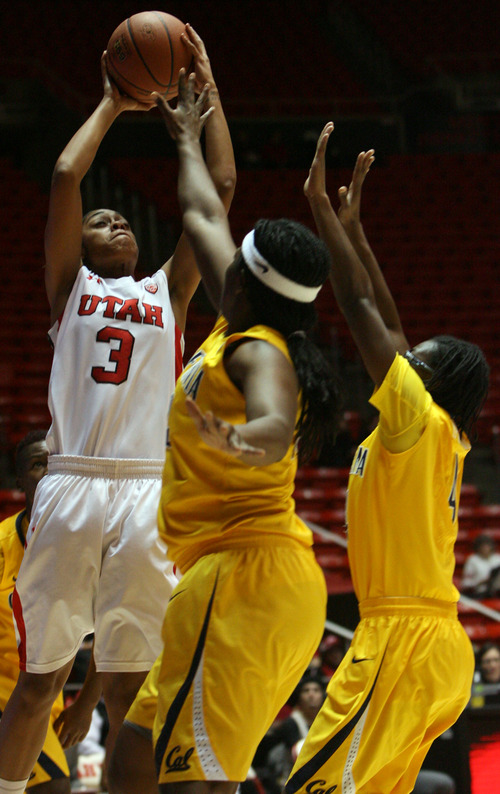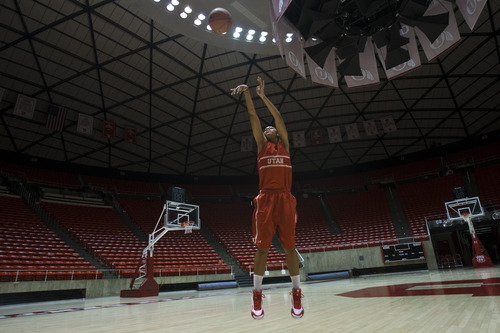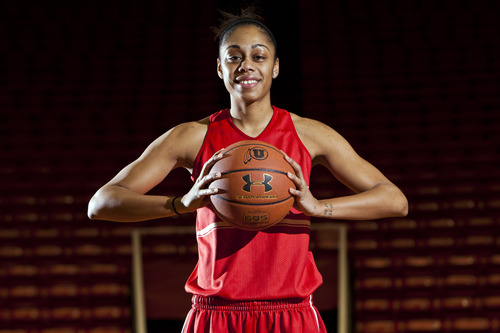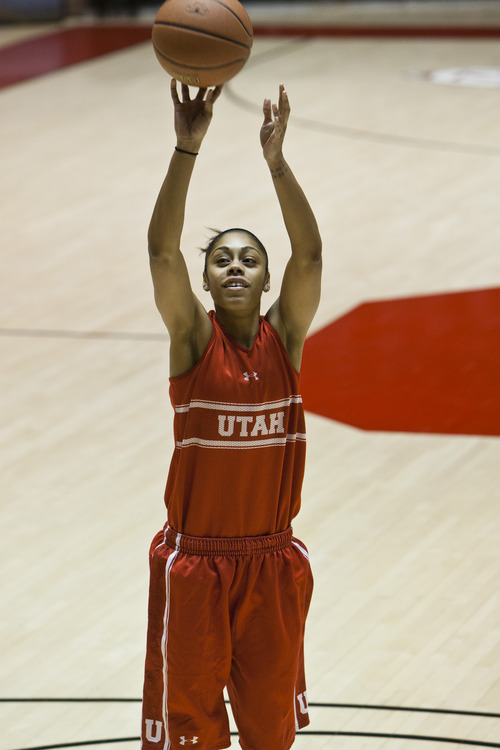This is an archived article that was published on sltrib.com in 2013, and information in the article may be outdated. It is provided only for personal research purposes and may not be reprinted.
All Iwalani Rodrigues could see was a blur.
The scoreboards on each end of the Huntsman Center floor are big enough to distract most players, and bright enough when lit to attract attention at any given time.
But it was all fuzzy to Rodrigues. She is a senior at Utah, two months away from the end of her collegiate basketball career. She's one of three current Utes with 1,000 career points to her credit. But Rodrigues has spent most of her life walking around with vision faulty enough that she was close to being legally blind.
"I knew my eyes were really bad," Rodrigues said. "But I was averaging 25 per game in high school, so I guess I was doing something right. I never said anything."
Her silence finally ceased on a crisp fall day during her freshman year at Utah. At the end of an intrasquad scrimmage, she informed her coach, Anthony Levrets, that she couldn't make out the numbers on the scoreboard from the adjacent bench. She didn't know what the score was, what the situation was, or what the next play should be.
Asked what the rim looked like, Rodrigues told Levrets that she often couldn't see the rim. On a trip to the eye doctor the next morning, Rodrigues couldn't read more than one letter.
"It was pretty bad," Levrets recalled. "It just tells you how good a player she's been."
This spring, Utah will hold a ceremony for a fresh batch of graduates. Rodrigues expects to walk on to the stage at the Huntsman Center and receive her college diploma, a degree in communications. Levrets will be there. Tears from the coach have been promised in advance.
The emotion comes with good reason. Rodrigues has endured — and conquered — a series of physical and personal obstacles that might have defeated a lesser person.
"I can't put into words how much Iwalani has meant to this program," Levrets said. "The staff and I invested a ton into her. Getting her to believe that she can be successful on and off the court. We tried to get her to look beyond the next five years. She's put in the work. She's an incredible player, and she's set herself up to have an incredible life."
Getting to this point, though has been a challenge.
Rodrigues grew up in Hawaii, raised by her father, Darin Bailey. She loved to surf, but basketball was her obsession. Rodrigues was a star on the court even in grammar school, a scorer and slasher who could do pretty much anything she set her mind to.
She slept and ate with a basketball, dreaming of a Division I scholarship as a ticket to the mainland. She was a star socially as well, a product of her being one of the best players in Hawaii.
But there were issues. In addition to her blurry vision, Rodrigues had dyslexia. Classes were a struggle, and her difficulties with math would come back to haunt her when it came time for college. She was getting by in school, but that was about the extent of it. And Rodrigues didn't feel like she got a lot of encouragement from the other end.
"Looking back, they just passed me through school because I was an athlete," Rodrigues said. "They didn't care about what I did or where I went after high school. They just cared about what I did on the court."
Her own reticence played a role as well. Rodrigues has never been much of talker. She grew up a pretty independent child, never really revealing her vision problems.
In hindsight, Bailey wishes he could have done more. But with his daughter bringing home decent grades, he didn't want to pry. And as a single father, he had his hands plenty full already.
Besides, Rodrigues had multiple scholarship offers. She chose Utah because former Ute coach Elaine Elliott and then-assistant coach Levrets convinced her a true family atmosphere awaited in Salt Lake City. Rodrigues also was drawn to Elliott and her passion for the game. In fact, she wound up being Elliott's last real big-time recruit before she retired.
"Utah really wanted her and put a lot of time into her," Bailey said.
Rodrigues came to the U. with some emotional baggage, though. Her father and mother, Andrea Walker, separated when Iwalani was a child, leading to almost 10 years of near-estrangement. The homesick freshman nearly bolted for home at one point, but stuck it out. She and her mother reunited that same year.
And finally, the vision problem got solved. Following the day she confessed to her coach that she couldn't really see much of anything, Rodrigues went to an eye specialist and was outfitted with high-powered contact lenses.
The result?
Rodrigues has become one of the best players to ever wear a Utah uniform, and has emerged as a team leader as a senior for a Ute team toiling in its second season in the Pac-12. On the court, she's one of the better shooting guards in the league, an offensive spark and a defensive ace on the perimeter. Off the court, she's now pulling a 3.2 GPA and has become a beacon for her teammates.
"Iwalani is just an inspiration to us all," Utah guard Cheyenne Wilson said. "She's been through so much in five years. There's nothing that she hasn't seen that we won't see, so all of the younger players go to her for advice. She's one of the best players and people on the team."
Twitter: @tjonessltrib —
Iwalani Rodrigues file
• Averages 12.1 points and 4.5 rebounds per game
• Once hit 13 consecutive 3-pointers, tying an NCAA record
• Owns the school record for 3-pointers in a season
• Will graduate this spring with a degree in communications
• Played at two high schools, Roosevelt and Kalani, in her native Hawaii
• Won three consecutive state titles as a high school player
• Won a Mountain West Conference tournament title as a sophomore at Utah
• Is an avid surfer —
Utah at Cal
P Sunday, 3 p.m.


